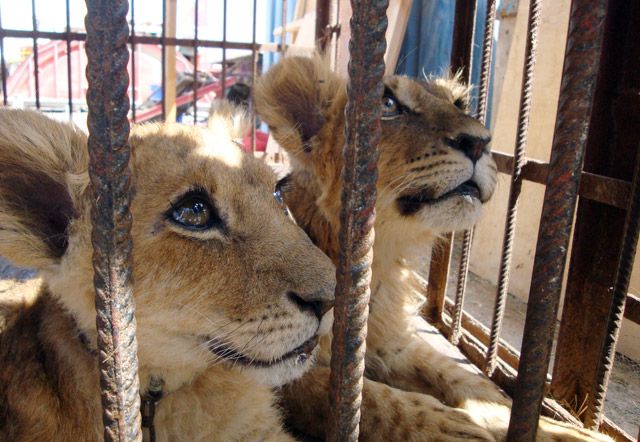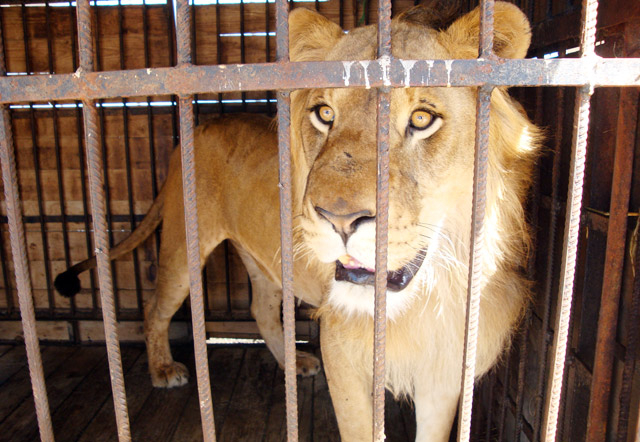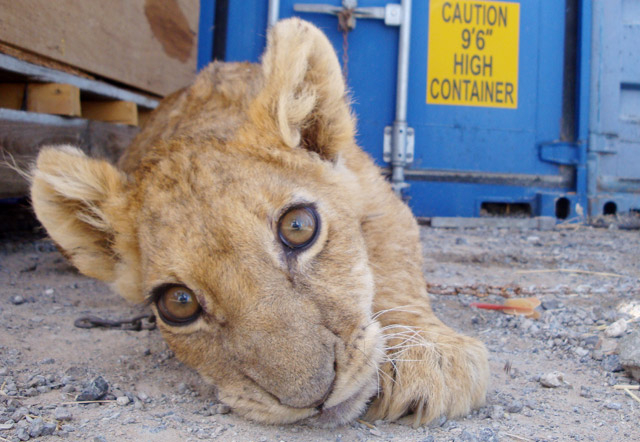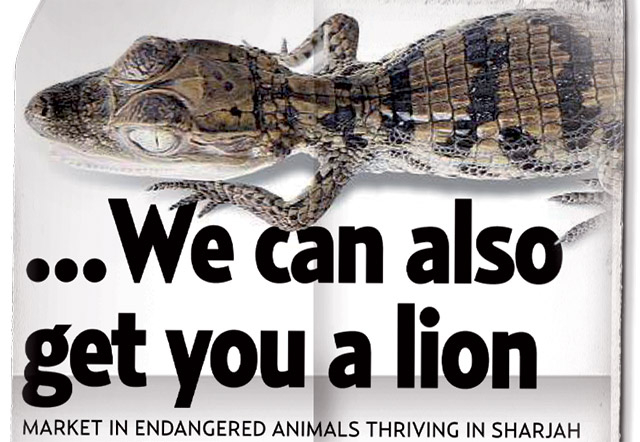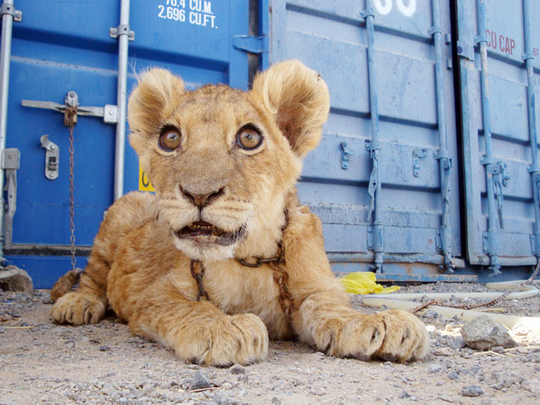
Dubai: Two lion cubs whose mother was used for tricks in an Egyptian travelling circus bound for Abu Dhabi next week are being sold on the black market in the UAE for Dh35,000 each despite being crippled by a calcium deficiency.
The illegal trade in endangered species continues to be rampant in the country, even as a federal UAE delegation attends the international summit in Doha for the Convention on International Trade in Endangered Species (CITES), an organisation that monitors the trade of over-exploited animals.
In pictures: Lion cubs up for sale
Gulf News obtained access to the cubs by posing as potential buyers. The owner, Mamdouh Al Helou, an Egyptian ‘lion trainer' in his 50s and his son, currently living in International City on their ‘first time' in the UAE, took Gulf News to a location far into the desert between Dhaid and Ras Al Khaimah.
"The Al Helou family is very well known in Egypt with regard to lions and tigers," he said. "It's a trade that has been passed down from father to son. My son Mohammad is a fifth-generation lion trainer."
Flanked by warehouses along a desolate road with no signposts to speak of, four wooden crates the size of a small car were lined up in the sun. Surrounding them were abandoned and rusting carnival rides which probably haven't heard the cheer of children in years.
The cubs, both male, peer out of the bars of their cage motionless, made lame due to being removed from their mother and her calcium-rich milk at too young an age. Their legs cannot carry the weight of their bodies, also due to a lack of exercise.
In the above video footage taken by Gulf News, the cubs can be seen failing to crawl during a short outing from their cage, their hind legs limp. Their mother and another adult lioness pace in the box next door. Further down, two male lions and a tiger, each languish in their own crates.
Al Helou said he is giving them injections of calcium supplements and vitamin B to help them recover. The cubs were also under veterinary care for three weeks at a clinic in Sharjah, Gulf News learnt.
"Calcium and vitamin deficiency may not be the reasons behind the cubs being lame," said a Dubai-based zoologist and big cat specialist who did not wish to be named without a chance to diagnose the animals for himself. "Lack of exercise is the most common reason for an ailment of this kind in [big cat] cubs in captivity." He added that it is not a fatal condition, "but it can affect the quality of life of the animal, depending on the severity of the condition. It may also be a hereditary disease due to inbreeding which happens in captivity." However he added, "If they can't stand then this is a very severe case."
The cats, listed in the Convention on International Trade in Endangered Species (CITES), are all due to perform at a circus in April in Abu Dhabi. While permits have been issued for the ‘display' of the animals by UAE authorities, no approval has been given for sale in any way.
John M. Sellar, Chief of Enforcement Assistance, CITES Secretariat said CITES only regulates the cross-border nature of trade. "Once an Appendix-II animal has been imported into a country, the provisions of CITES do not apply. Domestic law would determine what can happen to it thereafter. Some countries, for example, have legislation governing the possession of dangerous animals (such as a lion) but I don't know what the situation is for countries in this region. If it wasn't ‘dangerous', for example an Appendix-II listed parrot or reptile, then most countries wouldn't have any control."
The ownership and trade of wild, dangerous or endangered animals in the UAE is monitored by two laws: law 11 for 2002 for international trade under CITES, and federal law 16 of 2007 on respecting animal welfare.
These clearly highlight that prior permission must be acquired by the Ministry of Environment and Water to own, sell or transport such animals into the country.
Mona Al Shamsi, head of the CITES unit at the Ministry of Environment and Water confirmed that the circus has been issued papers to bring the circus to the UAE under strict conditions that animals be flown in rather than driven long distances, vaccinated, micro-chipped and "most importantly the same number of animals brought inside must be taken out".
She added that on no condition was selling any of the animals authorised by the Ministry.
Dr Al Saeed Mohammad from the International Fund for Animal Welfare added that while the ministry must be notified of wild animal sales, there seems to be no article under which a buyer can be prosecuted. Permits for "personal use" are issued under certain conditions.
UAE law and CITES
The ownership and trade of wild, dangerous or endangered animals in the UAE is monitored by two laws: law 11 for 2002 for international trade under CITES, and federal law 16 of 2007 on respecting animal welfare. These clearly highlight that prior permission must be acquired by the Ministry of Environment and Water to own, sell or transport such animals into the country.
Mona Al Shamsi, head of the CITES unit at the Ministry of Environment and Water confirmed that the circus has been issued papers to bring the circus to the UAE under strict conditions that animals be flown in rather than driven long distances, vaccinated, microchipped and “most importantly the same number of animals brought inside must be taken out”.
She added that on no condition was selling any of the animals authorised by the Ministry. Dr Al Saeed Mohammad from the International Fund for Animal Welfare added that while the ministry must be notified of wild animal sales, there seems to be no article under which a buyer can be prosecuted. Permits for “personal use” are issued under certain conditions.


